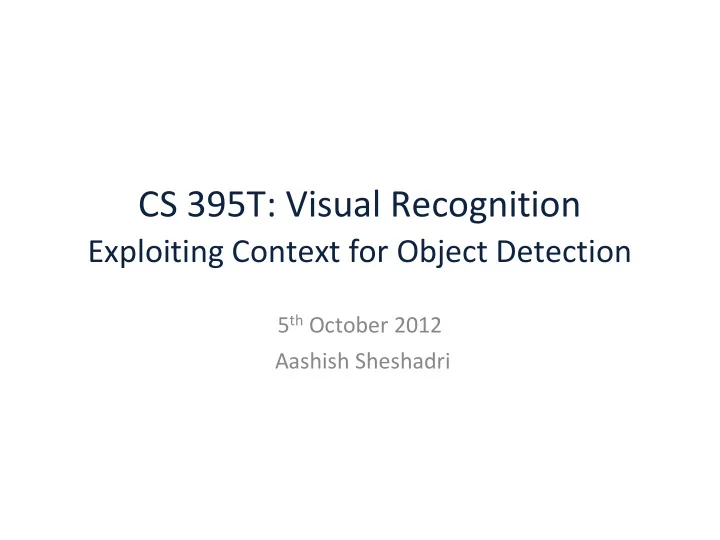

CS 395T: Visual Recognition Exploiting Context for Object Detection 5 th October 2012 Aashish Sheshadri
Components Analyzed 1. Scene Classification using GIST Descriptors. 2. Contextual Priming.
Scene Classification • Dataset : 15 Scene Categories - The Ponce Research Group [1]. – Indoor and Outdoor Scenes. • Descriptor : GIST Discriptor. – Matlab code by A. Oliva [2]. – [1] http://www-cvr.ai.uiuc.edu/ponce_grp/data/ – [2] http://people.csail.mit.edu/torralba/code/spatialenvelope/
Scene Classification • Classifiers : – K-Nearest Neighbors (KNN) • Consensus among five neighbors. • Euclidean distance. • Netlab Toolbox for Matlab [1]. – Support Vector Machine (SVM) • One vs All. • RBF Kernel. • LIBSVM package for Matlab [2]. – [1] http://www1.aston.ac.uk/eas/research/groups/ncrg/resources/netlab/ – [2] http://www.csie.ntu.edu.tw/~cjlin/libsvm/
Neighbor Presence 5 4 3 2 1
Nearest Neighbors Suburb Coast Forest Highway Inside City
Nearest Neighbors Mountain Open Country Street Tall Building Office
Nearest Neighbors Bedroom Industrial Kitchen Living Room Store
Confusion Matrix (SVM) Open Country Tall Building Living Room Inside City Mountain Industrial Bedroom Highway Kitchen Suburb Forest t Office Coast e Store e r t S Suburb 84 1 8 0 0 0 0 0 3 4 0 0 0 0 0 Coast 0 75 9 2 0 2 4 3 0 4 0 0 0 0 1 Forest 0 0 83 0 0 4 10 2 0 0 0 0 0 0 1 Highway 0 5 4 66 12 1 0 2 3 6 0 0 0 0 1 Inside City 3 0 10 1 50 5 8 18 3 0 0 0 1 0 1 Mountain 0 0 5 0 2 73 12 5 1 2 0 0 0 0 0 Open Country 0 5 10 1 0 3 72 4 0 4 0 0 0 0 1 Street 0 6 2 0 11 1 0 78 0 2 0 0 0 0 0 Tall Building 0 5 1 1 0 3 0 2 76 0 0 11 0 0 1 Office 2 0 6 0 0 5 0 3 0 59 0 0 1 20 4 Bedroom 0 2 10 1 1 7 0 5 0 15 25 0 10 23 1 Industrial 0 5 15 3 3 5 8 10 16 11 0 16 0 0 8 Kitchen 0 1 18 4 2 8 0 2 0 20 0 0 25 10 10 Living Room 0 2 14 6 0 6 0 4 3 8 2 0 16 23 0 Store 0 10 10 3 1 5 1 8 2 22 1 0 0 0 37 Average Classification Rate : 56.13%
Inferring Object Presence and Location • Identifying scene category enables object inference. • Using scene information to infer object location. • Statistical inference of object location using GIST of the scene to enable contextual priming [1]. - [1] Contextual Priming for Object Detection by Antonio Torralba.
Mixture Density Networks (MDN) • Combination of mixture model and a neural network. • Learning conditional distributions by training the network. • Input GIST vector and train network to learn desired probability distribution. • MDN implementation used from Netlab Toolbox [1]. - [1] http://www1.aston.ac.uk/eas/research/groups/ncrg/resources/netlab/
Segmented and Annotated Dataset [1] [1] http://labelme.csail.mit.edu/Release3.0/
Inferring Location of Cars • Scene categories with cars - Mountains, Street, Open Country - We’ve Travelled Everywhere!
Learning Distributions • 566 Training Examples. • Distributions Learnt: – P(Y|g). – P(s|g). • Set P(X|g) to be uniform across the image.
Single Instance
Multiple Instances • Multiple modes ?
Difficult Scenes
Where are the Cars?
Predicting Scale
Failed Scenes
What’s Important • Car side view. • Present but occluded. • Frontal view. • Just right.
Finding People ?
Pedestrians
Faces
Failed Instances
Something Challenging.. Lamps?
Lamps Better Results?
Closing Points • When does it work ? • Why does it work ? • How can we improve inference?
Recommend
More recommend